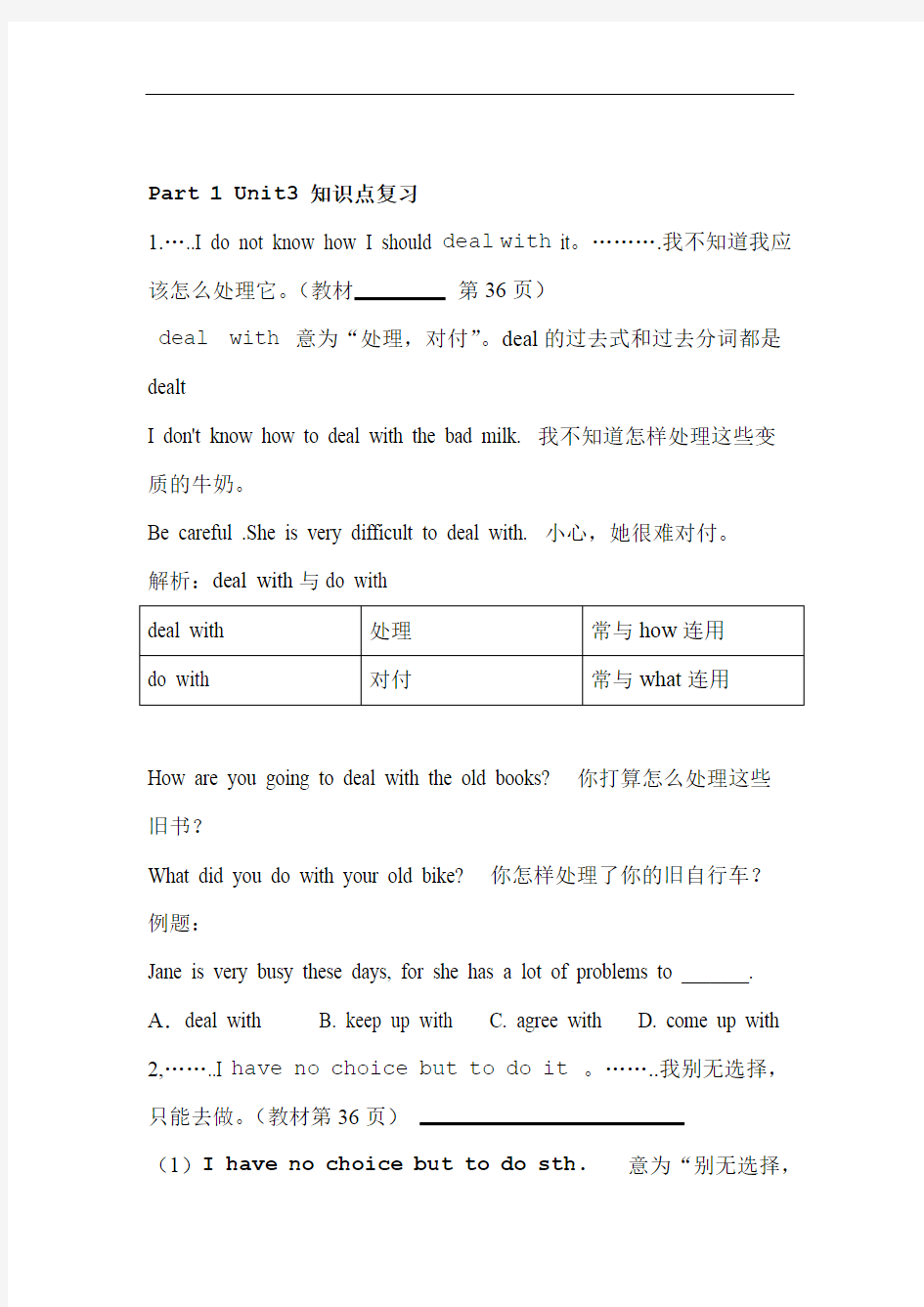牛津译林版9A Unit3 知识点梳理练习无答案


Part 1 Unit3知识点复习
1.…..I do not know how I should deal with it。……….我不知道我应该怎么处理它。(教材第36页)
deal with意为“处理,对付”。deal的过去式和过去分词都是dealt
I don't know how to deal with the bad milk. 我不知道怎样处理这些变
质的牛奶。
Be careful .She is very difficult to deal with. 小心,她很难对付。
解析:deal with与do with
How are you going to deal with the old books? 你打算怎么处理这些
旧书?
What did you do with your old bike? 你怎样处理了你的旧自行车?
例题:
Jane is very busy these days, for she has a lot of problems to _______. A.deal with B. keep up with C. agree with D. come up with 2,……..I have no choice but to do it。……..我别无选择,只能去做。(教材第36页)
(1)I have no choice but to do sth.意为“别无选择,
只能去做某事”。
She has no choice but to study hard. 她别无选择,只能努力学习。
I had no choice but to sign the contract. 我别无选择,只能签了合同。例题:
My wallet was gone,so I had no choice but (ask) the policeman for help.
(2)choice此处意为“选择权;选择的可能性”,还可意为”选择”。其动词形式是choose。
He had no choice but to leave. 除了离开,他别无选择。
You have to make a choice between the two things.你必须在两件事之间做出一个选择。
例题:
21
/ 1
1)There are different clothes in our shop.You can have many (choose).
2)It is a difficult c_______ to give up an interesting and satisfying job.
(3)but用作介词,表示“除了”,相当于except。但but 习惯上用于no, nothing, nobody, not
anything 等标示否定的词(组)之后。
I have no friends but a card in the box.箱子里除了一张卡片外,没有别的东西。
解析:but, except, 与besides
Last night I did nothing but watch TV.昨天晚上除了看电视,我什么也没干。除了汤姆,我们都去看电影了。他生病We all went to the cinema except Tom.He was ill.
了。除了你之外,埃米还有另外两个好朋友。Amy has another two good friends besides you.
然后有时候我发现第二天很难4.Then I sometimes find it hard to stay awake the next day.(教材第保持清醒。36页),是表语形容词,在句中通常作表语或宾语补此处用作形容词,意为awake“醒着的”足语,不能作前置定语。21
/ 2
Is he awake or asleep?他醒了还是睡着了?
This thought kept me awake all night.这种想法使我整夜未合眼。
解析:awake 与wake
昨天我上床睡觉很早,但是Yesterday I went to bed early ,but I was awake for a long time . 很长一段时间是醒着的。门铃声把婴儿弄醒了。The sound of the doorbell awoke the baby. I often wake up at six every morning.我经常每天早上六点醒来。例题:根据句意和所给的汉语提示,写出句子中的单词。)all the night.
醒着After the sudden earthquake, most of us were ______(我知道按时做完所有的家庭作.5.I know it is important to finish all my homework on time36页)业是重要的。(教材第准时,按时On time 意为“”。Take the medicine on time .按时吃药。The teacher asked us to hand in our homework on time .老师叫我们按时交作业。on time
In time 及时准时] 拓展[time 构成的其他短语21
/ 3
All the time 一直,始终from time to time 偶尔,有时
At times 有时,偶尔at all times 随时,总是
At a time 每次;逐一at the same time 同时
6.However,I hardly have any spare time for my hobbies like volleyball and music.然而,我几乎没有任何空闲时间从事我的业余爱好,像排球和音乐。
hardly副词,意为“几乎不”,相当于almost not,用于连系动词、助动词或情态动词之后,实义动词之前。
I hardly ate anything last night.我昨天晚上几乎什么也没吃。
I am too thirsty.But there is hardly any water in the bottle.我太渴了,但
是瓶子里几乎没有水。
[拓展]hardly为否定副词,出现在反义疑问句中时,后面的附加疑问
句部分要用肯定式。类似用法的还有never,seldom等。
例题:
We have any spare time for hobbies at school.
A.hard
B.hardly
C.really
D.real
7.I often doubt whether it is worth spending so much time on homework.我常常怀疑花这么多时间做
家庭作业是否值得。
(1)doubt此处为及物动词,意为“怀疑”。在肯定句中,doubt后一般接whether或if引导的宾语从句。在疑问句和否定句中,doubt
后接that引导的宾语从句。
I doubt whether I'll be successful.我怀疑我是否能成功。
I don't doubt that he'll come.他一定会来,我不怀疑。
[拓展]1)doubt 还可用作不及物动词,意为“怀疑”,常与about或of 连用。
She doubts about everything.她对一切都怀疑。
2)doubt还可作可数或不可数名词,意为“怀疑”,常用短语有:
21
/ 4
in doubt不肯定,不确定
no doubt无疑地,很可能
There is no doubt that he will succeed one day.毫无疑问,他终有一天会成功的。
(2)be worth doing sth.意为“值得做某事”。后接名词、代
词或动名词,但不接动词不定式。注意,修饰worth的程度,表示“很”,用well不能用very。
The book is well worth reading.这本书很值得读。
例题:
()do you like that film?---Wonderful!It's worth .
A.How;to watch
B.What;watching
C.How;watching
D.What;to watch
(3)spend time/money on sth.意为“花费时间/金钱在某事
或某物上”。
He spent two yuan on the pencil.他花2元买了这支铅笔。
8.Then I get into trouble because my parents do not allow me to play outside after 6 p.m.然后我就陷入了困境,
因为我的父母不允许我下午6点后在外面玩。
allow此处用作及物动词,意为“允许,准许”。后面可以跟名词、代词、动名词作宾语,allow后还可以跟动词不定式作宾语补足语。His parents don't allow smoking.
Please allow me to introduce myself to you.
例题:
Girl students in some schools are not allowed (have) long hair.
9.I need someone to share my worries with.我需要有人来分担我的烦恼。
worry此处为可数名词,意为“担心;令人担忧的事”,其复数形式为worries。也可用作不可数名词,意为“烦恼,担忧”。
I'm full of worries.我有种种烦恼。
Too much worry made him look old.他烦恼太多,显得老了。
21
/ 5
例题:
把忧虑留给自己会使他们更糟。
can make them
worse.
10.Soon they got his replies.很快他们得到了他的答复。
